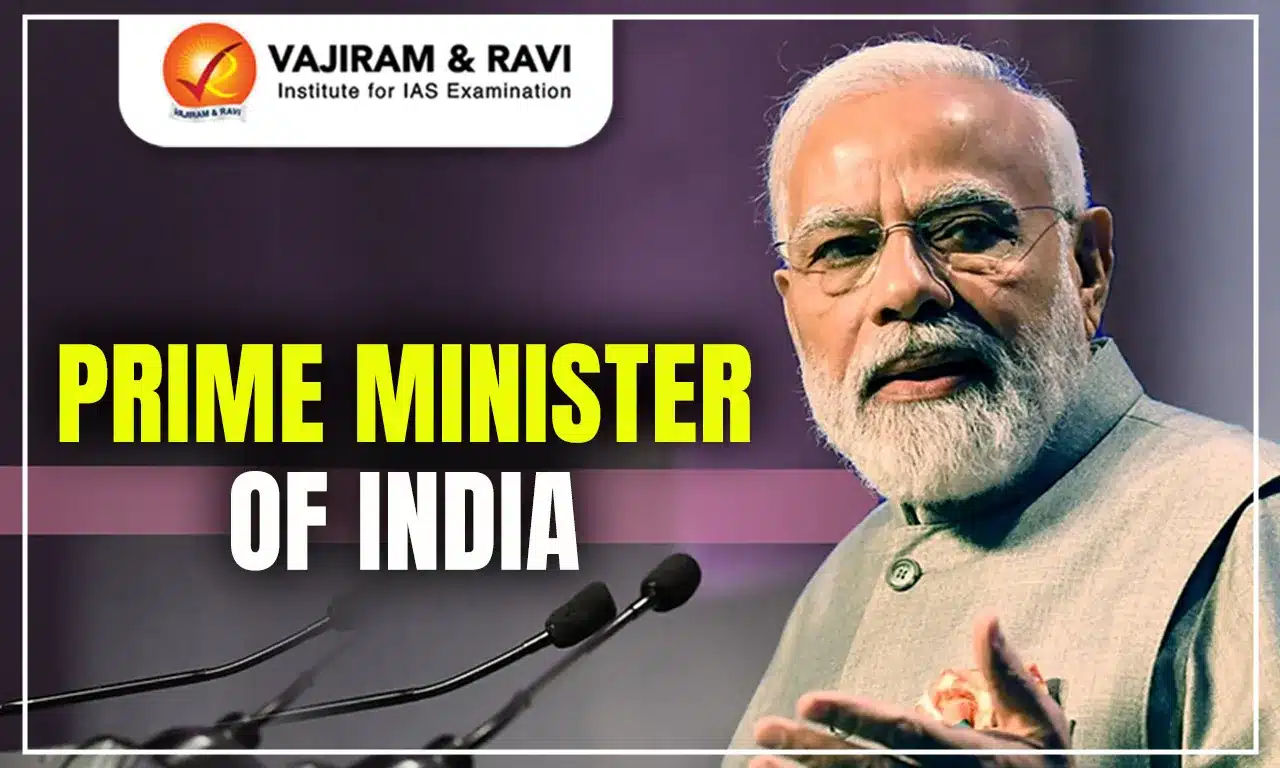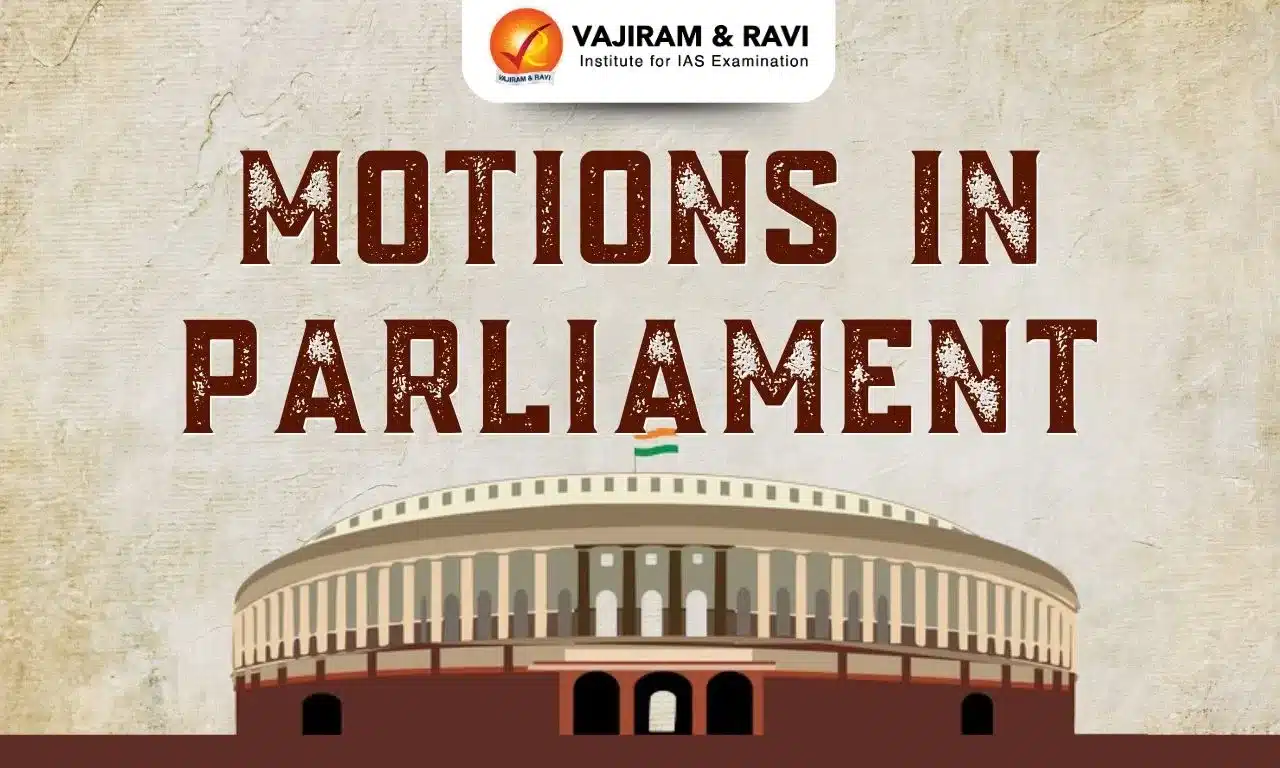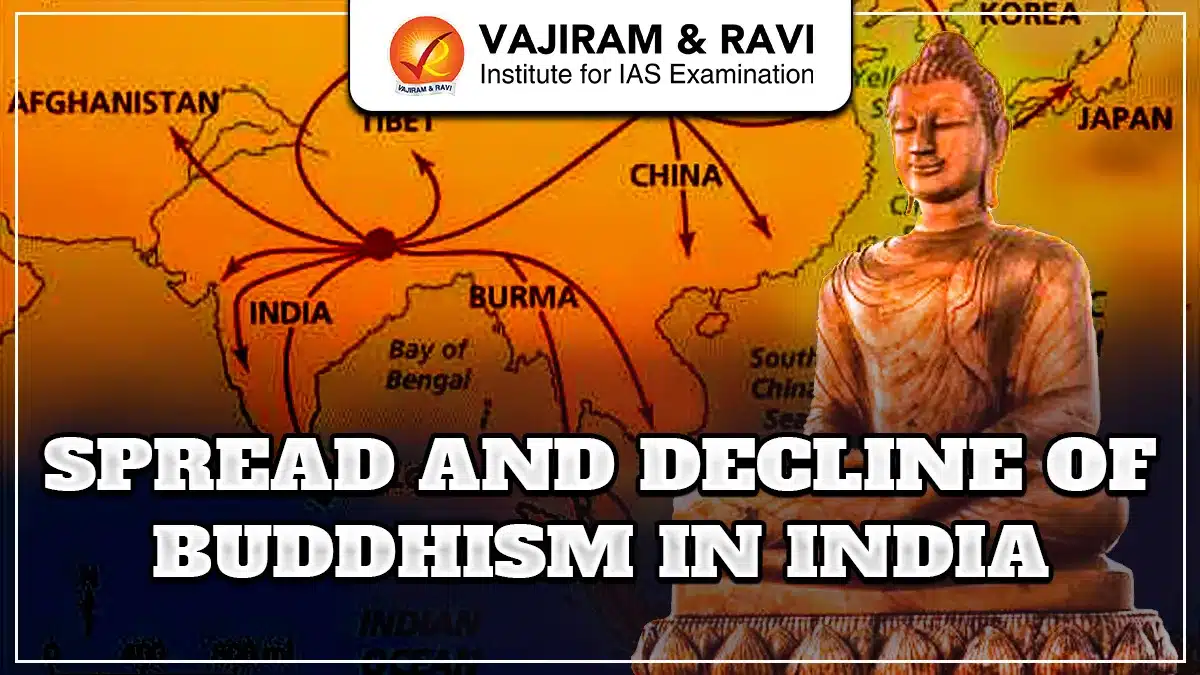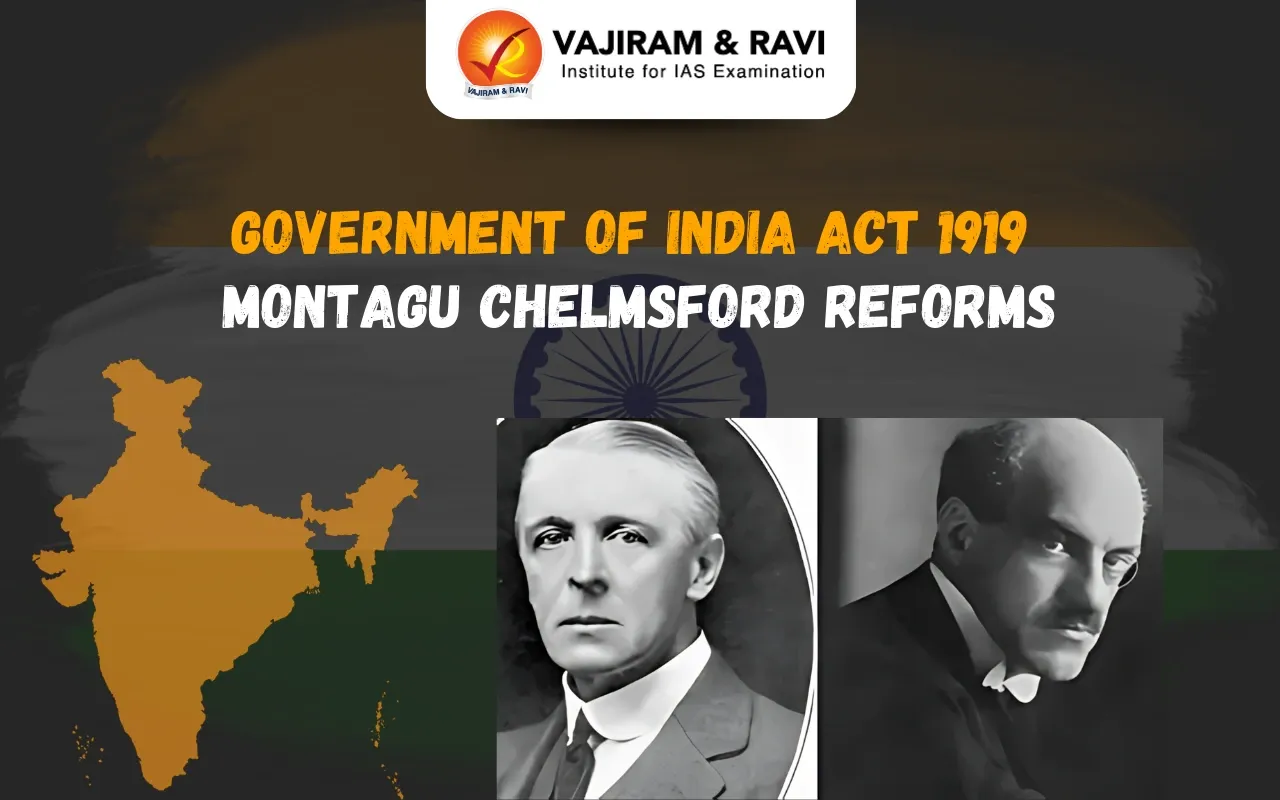Why is the Indian Government called a ‘Prime Ministerial Government’?
A Prime Minister is the head of government in India's political setup. He is the de facto head of state.
- The Prime Minister is appointed by the President of India and is the leader of the party or coalition that holds the majority of seats in the Lok Sabha, the lower house of India's parliament.
- The Prime Minister is responsible for the administration of the government and serves as the chief spokesperson for the government's policies.
- Under Article 75, the Council of Ministers shall be appointed by the President on the advice of the Prime Minister.
- Also, Article 74(1) states that there shall be a Council of Ministers with a Prime Minister at the head to aid and advise the President. Thus, other ministers work under the direction of the Prime Minister.
Hence, in the parliamentary system of India, the role of the Prime Minister has become so significant and crucial that the form of government in India is called a ‘Prime Ministerial Government’.
What are the constitutional provisions pertaining to the office of the Prime Minister of India?
| Article | Description |
| Article 75(1) | The President shall appoint the Prime Minister who, in his opinion, commands the confidence of the majority of the members of the Lok Sabha |
| Article 75(1) | The Prime Minister shall be appointed by the President and the other Ministers shall be appointed by the President on the advice of the Prime Minister |
| Article 75(1) | The Prime Minister shall be the head of the Council of Ministers |
| Article 75(3) | The Council of Ministers shall be collectively responsible to the Lok Sabha |
| Article 75(2) | The Prime Minister can be removed from office by a vote of no confidence passed by a majority of the members of the Lok Sabha, or if he resigns from office. |
| Article 75(3) | The Prime Minister holds office during the pleasure of the President but must have the support of a majority of the Lok Sabha. |
| Article 84(2) | Must be a citizen of India and a member of either the Lok Sabha or the Rajya Sabha. |
Appointment of the Prime Minister
The Constitution does not specify a particular process for selecting and appointing a Prime Minister.
- According to Article 75, the Prime Minister is appointed by the President. However, this does not mean the President can choose any person as Prime Minister.
- In line with the conventions of a parliamentary government system, the President typically appoints the leader of the majority party in the Lok Sabha as Prime Minister.
- When no party holds a clear majority in the Lok Sabha, the President may use their discretion in selecting and appointing the Prime Minister.
- In such cases, the President usually chooses the leader of the largest party or coalition in the Lok Sabha as Prime Minister and requests that they obtain a vote of confidence from the House within a month.
Oath, Term, and Salary
- Oath: Before assuming the office of the Prime Minister, the President administers oaths of office and secrecy to the Prime Minister-Elect. As part of the oath of office, the Prime Minister takes an oath
- to bear true faith and allegiance to the Constitution of India,
- to uphold the sovereignty and integrity of India,
- to faithfully and conscientiously discharge the duties of his office, and
- to do right to all manner of people in accordance with the Constitution and the law, without fear or favour, affection or ill will.
- Term: The duration of the Prime Minister's term is not fixed, and they hold the position at the pleasure of the President. However, this does not mean the President can remove the Prime Minister at anytime.
- As long as the Prime Minister maintains majority support in the Lok Sabha, He/She cannot be dismissed by the President. But, if he/she loses the confidence of the Lok Sabha, he/she must resign, or the President may dismiss him/her.
- Salary: The Prime Minister's salary and benefits are periodically set by the Parliament and include the compensation and perks given to a member of Parliament, as well as additional perks such as a sumptuary allowance, free housing, travel allowances, and access to medical facilities.
What are the powers of the Prime Minister of India?
The powers of the Prime Minister of India can be broadly categorized into the following:
- Executive powers: The Prime Minister is the head of the Union Council of Ministers and is responsible for the administration of the government. He presides over cabinet meetings and coordinates the activities of the various ministries and departments.
- Legislative powers: The Prime Minister is a member of the Lok Sabha or the Rajya Sabha and can participate in the proceedings of either house. He advises the President on the summoning and prorogation of the parliament sessions and dissolution of Lok Sabha.
- Diplomatic powers: The Prime Minister represents India in the international arena and conducts negotiations with foreign countries. He also receives foreign diplomats and dignitaries on behalf of the President.
- Emergency powers: In times of national emergency, the Prime Minister advises the President on the measures to be taken to protect the security of India.
- Appointment powers: The Prime Minister (and the Council of Ministers) advises the President with respect to the appointments to the higher judiciary and key administrative posts such as the Governors, the Chief Election Commissioner, the Comptroller and Auditor General of India, and the Attorney General of India.
- Financial powers: The Prime Minister is responsible for the overall economic and financial management of the country. His/her government presents the annual budget to the parliament and ensures it is passed.
What are the functions and responsibilities of the Prime Minister of India?
The Prime Minister is the head of the Union Council of Ministers, the head of the Government of India, and is responsible for the administration of the government. He presides over cabinet meetings and coordinates the activities of the various ministries and departments.
Relating to the Council of Ministers(CoM)
As head of the Union council of ministers, the Prime Minister holds the functions and responsibilities:
- Recommending individuals for appointment as ministers by the President, who can only appoint those recommended by the Prime Minister.
- Assigning and reassigning portfolios among ministers.
- Asking for a minister's resignation or advising the President to dismiss them in case of conflicting opinions.
- Presiding over meetings of the council of ministers and influencing its decisions.
- Guide, direct, control, and coordinate the activities of all ministers.
- Bringing about the collapse of the council of ministers by resigning from office.
Relating to the President
The Prime Minister serves as the primary means of communication between the President and the council of ministers.
- It is the Prime Minister's responsibility to inform the President of all decisions made by the council of ministers regarding the administration of Union affairs and legislative proposals.
- The Prime Minister provides guidance to the President in regard to the appointment of key officials such as the Attorney general of India, the Comptroller and Auditor General of India, the chairman and members of the Union Public Service Commission (UPSC), Election Commissioners, the chairman and members of the Finance Commission, among others.
Relating to the Parliament
As the leader of the Lok Sabha, the Prime Minister holds the following functions and responsibilities:
- Advising the President on summoning and prorogation of the sessions of Parliament.
- Recommending the dissolution of the Lok Sabha to the President at any time.
- Announcing government policies in the House.
Other Functions and Responsibilities
In addition to the three primary roles given above, the Prime Minister also has several other functions and responsibilities, including
- Chairman of the various bodies like- NITI Ayog (which succeeded the planning commission), National Integration Council, Inter-State Council, National Water Resources Council, and other related bodies.
- Shaping the country's foreign policy.
- Chief spokesperson for the Union government.
- Chief crisis manager at the political level during emergencies.
- Meeting various groups of people in different states and receiving a memorandum from them regarding their issues as a leader of the nation.
- Leader of the party in power.
- Political head of the services.
What is the function of the PMO(Prime Minister’s Office)?
In India, the Prime Minister's Office (PMO) is the administrative body that assists the Prime Minister in managing the Government of India and exercising his/her constitutional, executive, and administrative functions.
- PMO is responsible for coordinating the functioning of various departments and ministries of the Government of India and advising the Prime Minister on a wide range of policy and administrative matters.
- The PMO is headed by the Principal Secretary to the Prime Minister and comprises several other senior officials who assist the Prime Minister in his/her duties.
- Some departments and bodies working under the purview of the PMO
- Department of Atomic Energy (DAE)
- Department of Space (DoS)
- National Security Council (NSC)
Last updated on February, 2026
→ UPSC Notification 2026 is now out on the official website at upsconline.nic.in.
→ UPSC IFoS Notification 2026 is now out on the official website at upsconline.nic.in.
→ UPSC Calendar 2026 has been released.
→ UPSC Final Result 2025 is expected to be released in the second week of April 2026.
→ Check out the latest UPSC Syllabus 2026 here.
→ Join Vajiram & Ravi’s Interview Guidance Programme for expert help to crack your final UPSC stage.
→ UPSC Mains Result 2025 is now out.
→ UPSC Prelims 2026 will be conducted on 24th May, 2026 & UPSC Mains 2026 will be conducted on 21st August 2026.
→ The UPSC Selection Process is of 3 stages-Prelims, Mains and Interview.
→ Prepare effectively with Vajiram & Ravi’s UPSC Prelims Test Series 2026 featuring full-length mock tests, detailed solutions, and performance analysis.
→ Enroll in Vajiram & Ravi’s UPSC Mains Test Series 2026 for structured answer writing practice, expert evaluation, and exam-oriented feedback.
→ Join Vajiram & Ravi’s Best UPSC Mentorship Program for personalized guidance, strategy planning, and one-to-one support from experienced mentors.
→ Check UPSC Marksheet 2024 Here.
→ UPSC Toppers List 2024 is released now. Shakti Dubey is UPSC AIR 1 2024 Topper.
→ Also check Best UPSC Coaching in India
Prime Minister of India FAQs
Q1. Can the member of the Rajya Sabha become the Prime Minister of India?+
Q2. Who is the longest-serving prime minister of India?+
Tags: prime minister of india quest
















